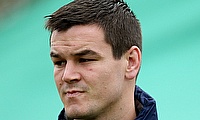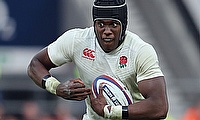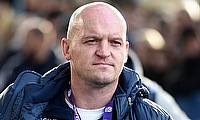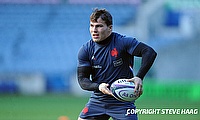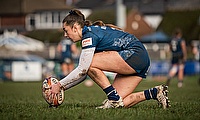Maro Itoje: ‘I believe this team has an incredible amount of potential’
Following England’s 27-13 loss to South Africa at Twickenham Stadium, England lock Maro Itoje says that their performance was ‘incredibly disappointing’.
Finishing the calendar with a losing record for the first time since 2008, England come out of the Autumn Nations Series battered and bruised and, on the whole, not looking all the better for the experience.
Up against the current Rugby World Cup holders, England were bullied up front from start to finish. Stifled at every opportunity, South Africa consistently won penalties, gradually broke down England and showed their immense superiority.
On the whole there have only been glimpses of what England are capable of this month. Perhaps the archetypal example is that final 10 minutes against New Zealand a week ago, where the side registered three tries in the final 10 minutes to draw 25-25 with their visitors.
“It’s disappointing,” Itoje said. “No two ways about it, it is incredibly disappointing. I believe this team has an incredible amount of potential, but we’re not showing that potential but we’re not showing that potential on a consistent basis, so I guess that’s the challenge for us as a team.”
As Angus Gardner’s full-time whistle blew, boos came from the stands. Those that had flocked to Twickenham were understandably disappointed by what they had just witnessed and have little reason for hope in the coming weeks with the Six Nations not all that far away.
The 28-year-old was described on social media as having a ‘sheepish grin’ as the boos spread across the field, although when asked what England fans should do, Itoje simply says to “just trust the process”.
There are also comparisons to England’s 2018. Four years ago, the team’s record was only slightly better at 6-6 at the end of the calendar year and a year out from the Rugby World Cup in Japan, things looked bleak.
You fast forward about 12 months later and England are in the World Cup final. Losing 32-12 at the hands of South Africa that day too in a similar manner, with nine games to go until France next year, Itoje describes World Cup years as “different”.
“We got more cohesive and World Cup years are a little bit different because – just the amount of time we get to spend with each other, it goes from being an international kind of feel to a club kind of feel,” Itoje said.
“Just because we have the whole summer, then the warmup games, so the start of preseason to the World Cup you get three months, so we’ll have that tie to get together, be tight, be cohesive, but I am not using that an excuse or anything.
“We need to be better. This is obviously the standard that we want to exhibit on the field. In terms of what we need to do, we just need to stick together. Stick together, believe in what we are doing.
“Players need to be reflective as well, need to be reflective as well, need to be reflective and see what we can do and what we need to do to get England on the front foot.”
As far as fostering that club feel goes, England players will go directly back to their clubs this week and get back into the cut and thrust of the Gallagher Premiership. Where the time comes from to strengthen bonds between all of that is uncertain.
Even so, a continuous narrative from the England camp is how the environment is significantly different to years gone by and stands them in good stead going forward.
“We’ve learned a lot about ourselves,” Itoje said. “We’ve had some hard lessons, today being one of them.
“There’s been a whole crop of English players who’ve been blooded into the team who have shown some of their ability. We’ve shown resilience. We’ve stepped forward in a number of areas.
“Eddie in the changing room said the difference of gap is not that much, but we have a long way to go to make it. So as it stands, now it seems as if we’re very, very far away, but there are a couple of things that we need to get right, but those things are necessarily easy to get right.
“We need to work hard at it, be more cohesive as a team and hopefully we’ll solve that.”

